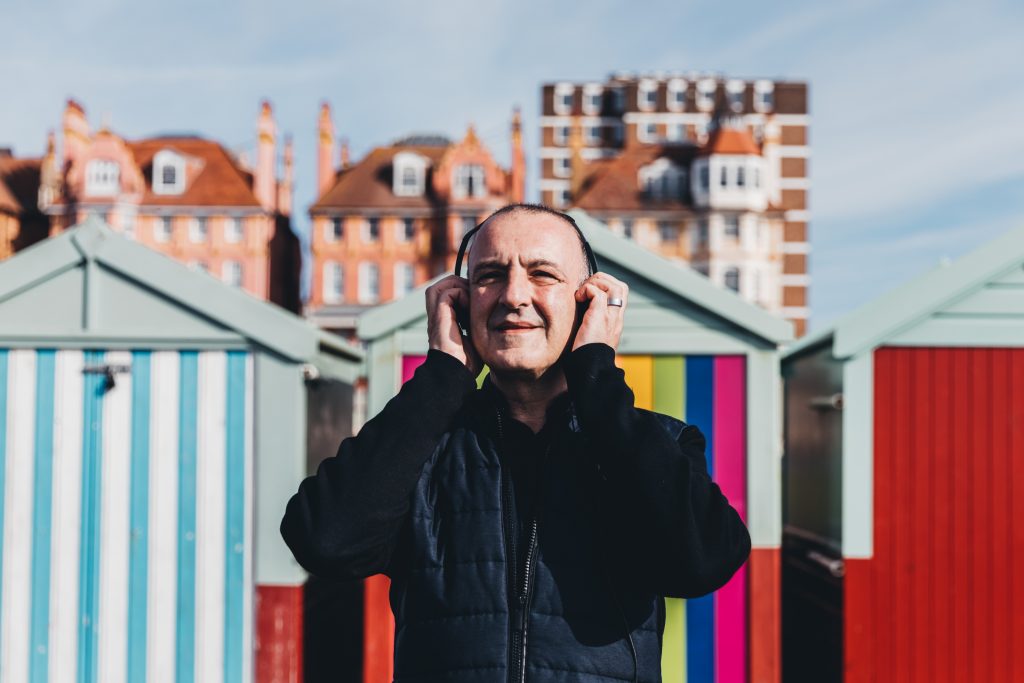Writer and Director Dinos Aristidou talks about his digital show ‘Hear Us Out’
Compiled from a year long period of research conducted by New Writing South, Dinos Aristidou’s digital performance ‘Hear Us Out‘ celebrates the stories of the elder LGBTQ+ community – a keyword from this performance being ‘visibility’; bringing to the fore stories that are often left untold. Dinos tells us more about how he’s feeling ahead of the show, his inspirations for the piece and the importance of verbatim within his work.
(Image courtesy of Rosie Powell)
Hi Dinos, your show Hear Us Out will play online on Saturday 28th November, how are you feeling ahead of the showing?
I’m really excited about the showing and looking forward to this as a celebration, not only of the stories but also of the achievements of the performers. It’s been an incredible experience creating this piece with so many different people involved at each stage. I think the showing of the final piece will be something special for everyone and a real affirmation and celebration of older LGBTQ+ lives and the artistic achievements of all the participants.
Hear Us Out has been inspired by a range of autobiographical tales which you’ve woven together to create the digital performance; these tales celebrating LGBTQ+ elders. What inspired you to explore this topic further?
For many older LGBTQ+ people, the journey to this moment of feeling able to tell our stories has been one of struggle and challenge and we felt that this needed to be recognised and celebrated alongside all the joyful stories of our adventures and connections. We were born in a time of silence, oppression and invisibility so it’s important to be heard and the story of these histories shared and celebrated. Having said that, I didn’t want this to be a reminiscence project but an affirmation of the present and of the stories that have brought us to this present and that we carry with us into the future. The world we live in has changed as a result of the people who ultimately couldn’t ignore or suppress who they are and the piece is very much about this and about the importance of being heard and visible. There’s also a different sort of invisibility that comes with getting older, especially for many LGBTQ+ people, so this project was also about providing opportunities for older LGBTQ+ people, through theatre, to share stories, to work with these stories and to find ways to perform them. Visibility is about being heard, to be heard is to be seen, so the very fact that this story is being told, made up of real voices, is a cause for celebration.
The New Writing South team of LGBTQ+ volunteers have been collecting stories from their community across South East England for a year. How did you find the research element of the process? Did you learn anything new from it?
The stories are all so diverse and so rich. They’re like oral portraits, capturing not only the person in the present but also the history that has brought them to this moment in time. They are so unique and when I started working on putting them together it was a challenge to find common threads. But it’s interesting to think of it more as a piece where the stories are in conversation with each other. Heard together, they tell a really interesting story not only of different times and places but also of the LGBTQ+ experience. Some stories really resonated with me, some stories sparked memories, transporting me to different moments in my life and some stories gave me incredible insights into areas outside of my own experience. That all of these are real life experiences makes the piece both authentic and revelatory. It is through listening that we genuinely connect and learn not only about others but also about ourselves. For me, this project has been about connection, both to the stories and to the community of participants that this project has created.
The performance will us the ‘Hear Us Out Technique’, whereby performers listen to the stories of LGBTQ+ people and perform live to camera. Why deliver the show using this particular style?
I’ve been interested in verbatim theatre for a while and have worked on a number of verbatim theatre projects prior to this. This project, however, gave us the time to develop our own particular form of verbatim theatre, the ‘Hear Us Out’ technique that isn’t just about the way the piece is performed but also about the way we collected stories, organised them and used them. For the performer, presenting a story as you listen to it, creates a deep connection with the storyteller which is important if you’re presenting a real life story. The performer doesn’t pretend to be a character but focuses more on listening and presenting what they hear with all its pauses, hesitations, repetitions. In a piece of theatre about being heard and listening to others, it’s important that the diverse voices maintain their individuality and that what they say is presented as they said it. The performer, I suppose, is the body through which stories are told so what we get is a strange mixture of performer whose body we see and the storyteller whose words we hear. For me, this makes for really compelling theatre that draws us in and really encourages us to listen carefully and respectfully to the words of others.
Questions by Lucy Basaba.
Hear Us Out will take place online on Saturday 28th November 2020. To find out more about the production, visit here…



Leave a Comment